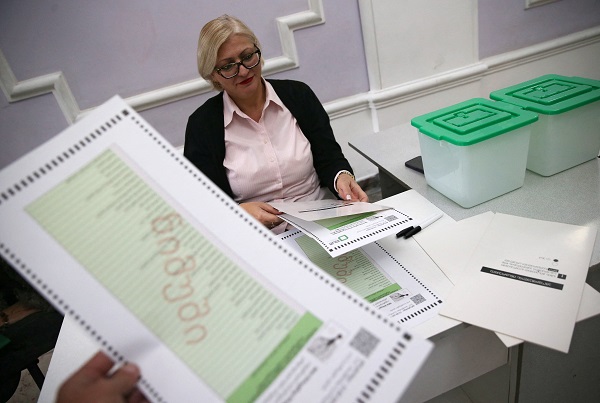 A member of an electoral commission arranges sample ballots at a polling station on the eve of the parliamentary elections in Tbilisi, Georgia, 25 October 2024;
Credit: Reuters/Irakli Gedenidze/File Photo
A member of an electoral commission arranges sample ballots at a polling station on the eve of the parliamentary elections in Tbilisi, Georgia, 25 October 2024;
Credit: Reuters/Irakli Gedenidze/File Photo
TBILISI (Reuters) - Georgians vote on Saturday 26 October 2024 in a parliamentary election depicted by both sides as an existential battle that will determine whether the country integrates closely with the West or leans back towards Moscow.
The vote pits the ruling Georgian Dream party, in power since 2012, against four main blocs representing the pro-Western opposition. Some 3.5 million Georgians are eligible to cast ballots.
Georgia, which lost swathes of its territory to Russian-backed separatists in the 1990s and was defeated in a brief Russian invasion in 2008, was for decades one of the most pro-Western states to emerge from the Soviet Union.
But since Russia's invasion of Ukraine in 2022, Georgian Dream has moved the country decisively back towards Moscow's orbit, accusing the West of trying to lure it into war. The opposition calls the shift a betrayal of Georgia's European future.
Media sympathetic to the opposing sides have published rival polls, with pro-opposition broadcasters forecasting Georgian Dream will lose its majority, and those supporting the ruling party predicting a landslide victory with its best showing ever.
Though all sides say they are hope for a peaceful vote, the country has had a volatile political history since the breakup of the Soviet Union, with several popular uprisings and episodes of civil unrest.
The authorities used force to disburse demonstrations this year against a law requiring groups that receive funding from abroad to register as foreign agents, which the opposition and the West called a Russian-inspired measure to stifle dissent.
"Global war party"
The reclusive billionaire founder of Georgian Dream, Bidzina Ivanishvili, has cast Saturday's election as an existential fight to prevent what he calls a "Global War Party" in the West from pushing Tbilisi into direct conflict with Moscow.
"Right now, some people don't understand the danger they might face if we're defeated. But we will try our best to win and show the people the correct path," Georgian Dream activist Sandro Dvalishvili told Reuters.
Georgian Dream says its aim is to obtain three quarters of the seats in parliament to introduce a constitutional ban on the main opposition party, the United National Movement.
Opposition parties and President Salome Zourabichvili, a critic of the government whose powers are mostly ceremonial, accuse Georgian Dream of buying votes and intimidating voters, which the ruling party denies.
Opposition activists say only a close alliance with the West, including membership in the EU, would protect Georgia from Russia.
"Russian imperialism's hunger knows no bounds. And that’s why we need strong allies. And those strong allies are in the European Union," said Nana Malashkhia, a former civil servant who shot to fame last year after being filmed waving an EU flag while being blasted with a police water cannon at a protest. She is now running for parliament.
The European Union granted Georgia candidate membership status last year but has put its application on hold in response to what it says is backsliding on democracy under Georgian Dream.
The four main opposition parties aim to form a coalition government to oust Georgian Dream from power and put Georgia back on track to join the EU.
"I'm very confident that tomorrow's vote will show that the Georgian people are choosing European prosperity over international isolation," Tina Bokuchava, leader of the United National Movement, said on Friday 25 October 2024.








